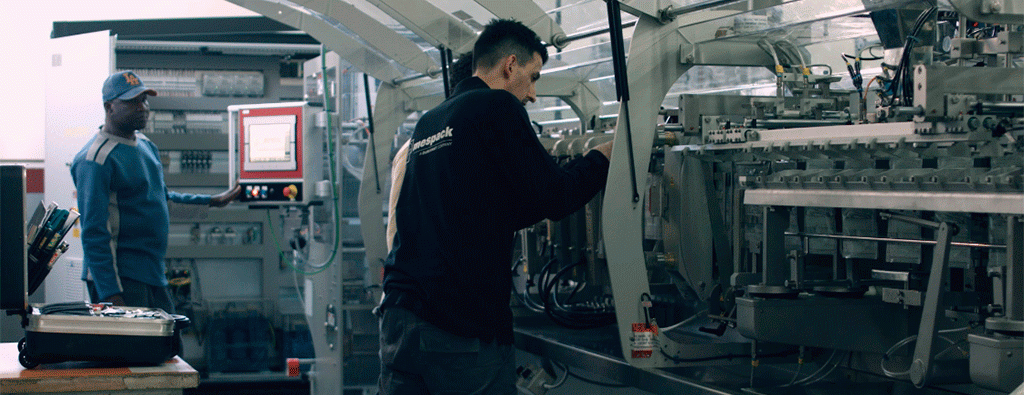- Preventive maintenance tasks allow to maintain high levels of efficiency and minimize unexpected shutdowns.
- There are daily, weekly, monthly and yearly maintenance actions. They include both the cleaning of the machine, as well as the proper lubrication of parts where required and the replacement of wearing parts.
What is the preventive maintenance plan and why is it important?
The preventive maintenance plan consists of a set of maintenance actions for the equipment. Its purpose is to ensure that the machines operate at optimal levels at all times, and, “unlike corrective maintenance, which involves repairing a fault with the equipment at the time of occurrence, preventive maintenance involves maintaining the high levels of production efficiency guaranteed by Mespack and avoiding unexpected shutdowns”, explains Oscar Ortega, Director of After Sales at Mespack.
What actions does it cover?
Ortega lists the main preventive maintenance actions as “the cleaning of the machine, which prevents the accumulation of dust and/or product in the equipment parts; the proper lubrication of parts where required, ensuring that friction does not affect the operation of the mechanism in question; and the replacement of wearing parts, preventing mechanisms from moving, which would otherwise affect the machine’s settings”.
How often should they be performed?
There are daily, weekly, monthly and yearly maintenance actions. In the case of Mespack, each equipment has a manual detailing the preventive maintenance actions required according to the machine’s operating hours. “The objective”, Ortega explains, “is to allow each client to design their preventive maintenance plan in accordance with their own working hours as well as being able to schedule time for production stoppages and the purchase of original spare parts in order to carry out these actions.”
Who should carry them out?
Preventive maintenance tasks should always be performed by qualified professionals. “Mespack provides on-site training to clients through TSS (Technical Support Services) personnel during the equipment setup period, focusing on the main daily or weekly tasks such as cleaning and lubricating machine,” recalls the company’s After Sales Director.
The tasks relating to the replacement of wearing parts require a higher degree of training since their substitution is often accompanied by a revision of the machine’s settings. “Therefore, in the event of not having properly trained personnel, we recommend hiring a TSS technician to carry out these tasks so that they can train the technical personnel in charge of the machine in the client’s factory at the same time”, he adds.
Mespack provides on-site training to clients through TSS (Technical Support Services) personnel during the equipment setup period, focusing on the main daily or weekly tasks
In addition, Mespack recommends that annual maintenance is carried out with the support of a Mespack TSS technician, since their presence will mean added value for the maintenance tasks themselves (they will review the settings and improve them if necessary; they will update and/or reinforce operator training, meaning they can train new staff; they will address doubts and questions; and they will carry out audits on the condition of the machine, recommending future actions as well as updates).












